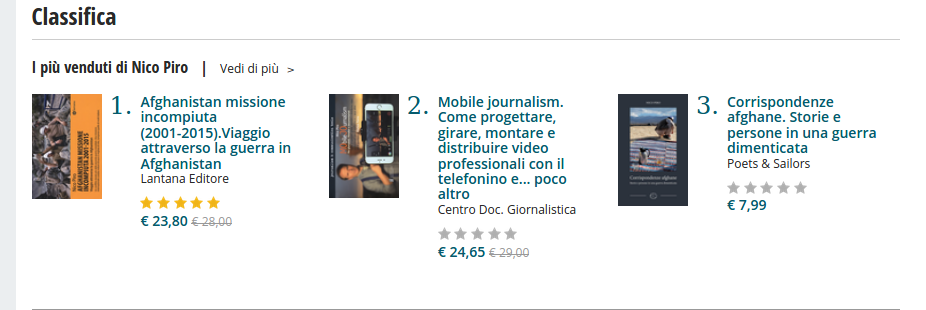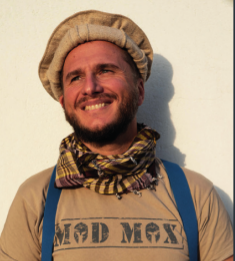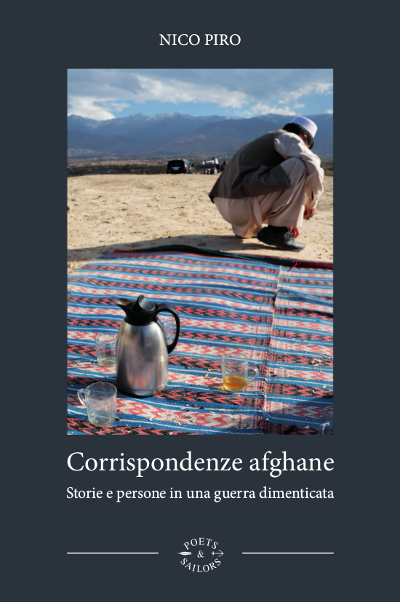La casa editrice Poets & Sailors nasce come progetto editoriale bilingue italiano/inglese. Autori di saggi coraggiosi che vogliono essere pubblicati e diffusi anche nella lingua di Albione. Anche se pubblicheremo noi stessi in inglese ci interessa dare sempre agli autori la migliore possibilità di pubblicazione.
In questo momento iniziale della casa editrice sono disponibili solo i diritti per i libri di Nico Piro: Corrispondenze Afghane e Afghanistan missione incompiuta 2001-2015.
The Poets & Sailors publishing house was born as a bilingual Italian / English editorial project. Brave essay authors who want to be published and spread also in the language of Albion. Even if we publish ourselves in English, we are always interested in giving authors the best chance of publication.
At this initial moment of the publishing house, only the rights for Nico Piro’s books are available: Corrispondenze afghane and Afghanistan Missione Incompiuta 2001-2015.


Nico Piro is a special correspondent for RAI, Italian public television and radio. He deals with crises and conflicts in some of the most complex areas on the planet, trying to give voice to the voiceless. Since 2006, he has been covering Afghanistan, a country where he has travelled widely, both alone and with NGOs, with western forces, local security forces, and above all with the Afghan people. For his work he has received multiple awards, including the Premiolino, the Ilaria Alpi award, the Marco Luchetta award, the Alberto Jacoviello award, the Frajese award, and the Giancarlo Siani award. In 2016 he published Afghanistan Mission Unaccomplished 2001-2015. He has also written about new tools and formats for journalism, which include How to Produce a CD-ROM (1997, Castelvecchi); Cyberterrorism (1998, Castelvecchi); and Mojo Mobilie Journalism (Cdg 2018).
Corrispondenze afghane
(literal English translation: Afghan Corrispondences)
This book recounts what is happening in Afghanistan; it gives voice to the stories and people who live amid a ferocious conflict, who, through desperation and surprising resilience, wish to look to the future.

In Afghanistan, the war didn’t end after the big withdrawal of western troops in 2014, which is what the wider public assumes from the silence in both the media and the political sphere.
Regardless of the billions spent and the western lives sacrificed for a conflict that has lasted longer than the second world war, Afghanistan is in chaos: the number of civilian victims has reached a historic high, opium production has never been greater, and the corrupt so-called democratic government controls only half its territory. The Americans are readying themselves to give the country back to the Taliban, and the Afghan people are readying for a new exodus from the country.
To write this book, I was in hospital wards stained with fresh blood; I visited enemy dens hidden in plain view; I passed through humble shops where million-dollar deals are made. I walked through prestigious offices crowded with corrupt officials; I selected the best pomegranates at a bazaar at the crossroads of the insurgency; I bought warm naan from old men squatting in storefronts, where the television was turned on. I drank tea whose steam warmed the diffidence of the people who poured it for me; I traveled on pick-up trucks with Afghan troops and was a moving target. With my hands, I ate from the same bowl of rice and mutton as journalists, intellectuals, the Taliban, bandits, traffickers of precious gems and archeological finds, undercover agents, fathers of families, armed watchmen, security contractors, policemen, politicians, athletes, doctors, nurses, the wounded, refugees and aspiring refugees, widows, and the orphans of war. To write this book, I have been with the Afghan people, who have always treated me as one of their own; for such a privilege, I can’t help but be grateful to destiny.
For more information and to have an evaluation copy write to rights@poetsandsailors.com or call +39 3774792469
